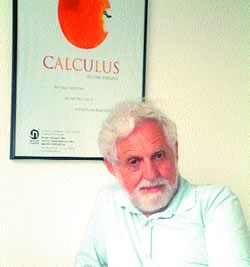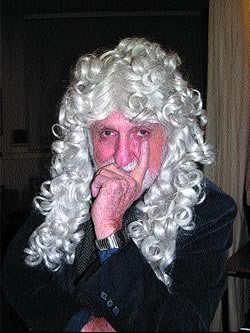

Camden New Journal, July 29, 2004
Few people
have changed the world but scientist-turned-playwright Carl Djerassi
tells Jane Wright he is still kissed by women for inventing the contraceptive
pill
HE is already one of the world’s most celebrated scientists. Now the inventor of the oral contraceptive pill, Professor Carl Djerassi, appears in old age to have stumbled upon the elixir of life. And it’s playwriting. At his summer home in Maida Vale, the still vigorous American chemist says: “I started as a scientist at 23, but I didn’t start writing plays until the age of 72. So as a playwright, I’m no longer 81 but 32, which is absolutely one of my attractions to literature.” Fifty years ago his science gave women across the globe control over their fertility and sparked a sexual revolution. It also placed Prof Djerassi as the only living member on the Sunday Times list of Thirty Men of the Millennium. That roster was headed by Britain’s most famous ever scientist, Sir Isaac Newton, and, coincidentally, the man who discovered gravity is the subject of Prof Djerassi’s latest play, Calculus, which opens at Hampstead’s New End Theatre on Friday. But the portrait he paints of the colossus of the 1700s is anything but flattering. Prof Djerassi tells me: “Newton was the greatest scientist, but he was also a very great shit.” Adhering to a scientific approach to playwriting, Prof Djerassi researched with two assistants for two years. He continues: “I’m bragging, but I also looked up every word in the play in the Oxford English Dictionary to check it had been used in 1700.” His drama is one of skulduggery, manipulation and fraud, in which Newton somehow persuaded top science club The Royal Society to credit him and not German rival Leibniz with the discovery of mathematical calculus. Prof Djerassi says: “These days, there would have been mad headlines in The Sun and The Daily Mirror and Newton would have been kicked out.” But he continues: “I’m not a muck-raking investigative journalist throwing dirt at scientists. If I do that at all, I’m really saying mea culpa because I’m one of them.” So is he also a shit? “Yes, to a certain extent. I’m a very ambitious person.” Prof Djerassi describes scientists as a highly competitive “tribe”, driven by a macho desire to see their own names emblazoned across report papers and prizes. He explains: “Many writers use a nom de plume. Four out of five readers don’t know or care that Hampstead author John Le Carré is really David Cornwell. Einstein or Carl Djerassi wouldn’t have dreamed of doing that.” His ambition means he is nervous of being at the mercy of reviewers. He says: “They make or break a play, which makes you very vulnerable, exposing you to criticism you never have in science, when it’s provided by your peers, not outsiders, and based on objective criteria, not taste.” He adds: “There is what I call a productive insecurity in me and in Newton. “To outsiders we’re highly successful, but we always need the approbation of external validation. You never have enough. “If you win one Nobel prize (which he has yet to do), then you want a second.” But surely he will never replicate his greatness as a scientist with his play writing? He recognises he is no Tom Stoppard, nor yet Camden Town’s Alan Bennett, both of whom he admires. And he acknowledges: “Scientists think I’m wasting my time. But I’m proud that my very first play was translated into 10 languages and broadcast on the BBC.” Indeed, there is a hugely serious purpose behind the genre he has invented, which he terms science-in-theatre. The professor of chemistry since 1959 at California’s prestigious Stanford University explains. “I don’t want to use the stage to give a lecture. I do that all the time in life. But people and politicians know very little of science and technology, when they ought to understand it, so society can take ethical decisions based on facts. That’s why I’m interested in smuggling scientific knowledge into my plays.” As a title, Prof Djerassi says Calculus refers to Newton’s calculating behaviour. But there is also plenty in the play about his science. Then he declares his respect for scientific knowledge also makes him “anti-religion”. “I have an intense, visceral dislike of President Bush. But for an accident of birth, he could have been one of the greatest ayatollahs he’s fighting against.” Never one to hide behind false modesty, Prof Djerassi reflects on the pill: “There’s no question that it liberated women. Now they can control their fertility and be economically independent, which puts them on the same level as men.” Despite the controversy of his discovery, which has separated the enjoyment of sex from reproduction, he continues: “The overwhelming number of women I meet are grateful. Some even kiss me.” My arrival has interrupted his work on a press article which asks when will we get a male pill? He says: “The pharmaceutical companies aren’t interested in contraception. It’s a question of economics. There are now more people over 60 than under 15 and that will never change again. At my age, I’m more concerned about Alzheimer’s disease than birth control.” He hung up his lab coat and turned to literature after two cataclysmic events in his life – fighting off cancer in his 60s, and the suicide of his beloved artist daughter Pamela when she was just 28. He ponders hard on this, before reflecting: “I respect suicide. People should be entitled to do it. “And I think now that my daughter was chronically depressed, which is a terrible illness.” Of course he would have done anything to avoid the tragedy, but he feels it has brought out a softer side to his personality. He explains: “Pamela’s death changed me. I like myself more as a human being now.” Indeed, Prof Djerassi is a master at putting positive spin on adversity. A Jew forced to flee his native Vienna at 14 to escape the Nazis, he arrived penniless in America and wrote to then first lady Eleanor Roosevelt for a scholarship. At 17, a skiing accident kept him out of the army, where he wanted to go, and where many friends were maimed or killed. But Alzheimer’s is the one thing he couldn’t cope with. He says: “When I closed my laboratory for the last time, the only thing I took with me was a bottle of cyanide, which I would swallow if I ever lost a functioning brain. “The problem is, I wouldn’t remember where I keep it.”